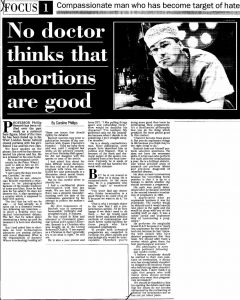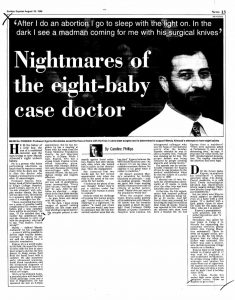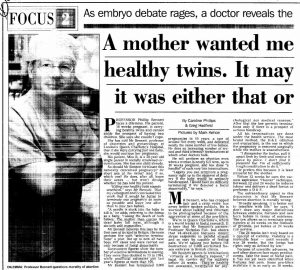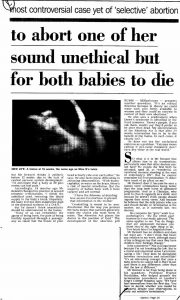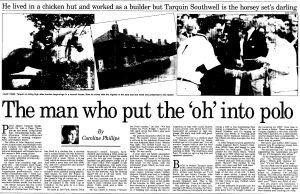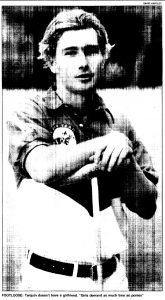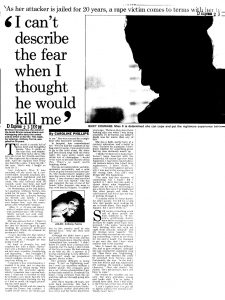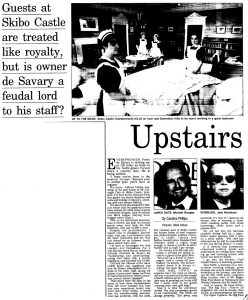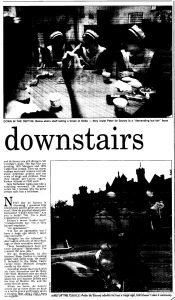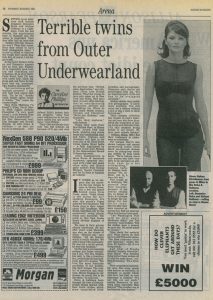GEORGE Greenfield, the man who discovered Jilly Cooper, acted as a middleman between Margaret Thatcher and Robert Maxwell and was agent to Enid Blyton, Stirling Moss, Ranulph Fiennes, Rex Harrison, David Niven and Sir Francis Chichester, has finally put pen to paper himself. His book, A Smattering of Monsters, A Kind of Memoir, show that, if nothing else, he has learnt one or two things about the value of spicy titles.
GEORGE Greenfield, the man who discovered Jilly Cooper, acted as a middleman between Margaret Thatcher and Robert Maxwell and was agent to Enid Blyton, Stirling Moss, Ranulph Fiennes, Rex Harrison, David Niven and Sir Francis Chichester, has finally put pen to paper himself. His book, A Smattering of Monsters, A Kind of Memoir, show that, if nothing else, he has learnt one or two things about the value of spicy titles.
Ask him who the monsters are to whom he refers and he’s mischievous. ‘I advised Lady Thatcher briefly and I’m also referring to Jeffrey Archer,’ says George. ‘But I’m using the word in the Latin sense of monstrum, meaning worthy of show.’
George, 77, the former head of one of Britain’s greatest literary agencies, John Farquharson Ltd, has spent 35 years importuning publishers and coaxing and bullying authors. He wears fawn cords and a brown cardigan. He has a moustache, sharp eyes and improbably arched eyebrows which give the appearance of being plucked. A raconteur, he has a theatrical manner, gesticulates with his arms and speaks in stacatto fashion, emphasising words unusually.
He recalls his meetings with Robert Maxwell. The proprietor offered George £10 million for Thatcher’s Memoirs only to withdraw the following day. ‘We all knew he was a a crook, of course.’ George remembers the negotiations. ‘Mark Thatcher, whom I rather like – he’s very punctual, polite and a bit of an oaf, but so what – said before a meeting with the Robert, ‘If we reach any conclusions, Mama wants to run them in front of her man of affairs, Sir Michael Richardson.’
‘When we were getting down to the nitty gritty in the meeting, Robert suddenly said ‘This sounds all right, but I must show my advisor Sir Michael Richardson.’ Afterwards I said to Mark ‘He can’t act for both sides.’ ‘Good God,’ said Mark, ‘I never thought of that.” Later, George was ‘kneeling in front of Thatcher,’ helping her with the contract for her Japanese rights, witnessing her signature for every page. ‘I suddenly felt a draught and realised my zip had slid down. There I was exposing myself to the great woman.’
George remembers David Niven fondly. ‘He was wonderful, very funny. Once he handed me a manuscript and said ‘It’s the most terribly boring, ghastly stuff.’ He was talking about his autobiography The Moon’s a Balloon, which went on to sell over 8 million copies worldwide.
‘David once had a lot of champagne and said to Prince Rainier at lunch, ‘Oh Rainier, buddy, I’d love to be you. You’re the last of the despots. If you see someone you can say ‘off with his head.’ And Rainier said ‘oh David, you’re the one I envy, you’ve had all those women in Hollywood. Tell me, who was the best?’ David hummed and ahhed then responded that ‘The best was Grace…’ Rainier went blue. ‘…Gracie Fields,’ continued David.’ George recollects the six times married Rex Harrison wryly. ‘He was an extraordinarily vain creature. Originally he wasn’t picked for the film of My Fair Lady – MGM wanted Cary Grant or Rock Hudson and were going round all the beefcakes first. In revenge, when Rex got his contract, he made them take his old Rolls Royce from where he lived in Portofino to Calais, across to Southampton, on the Queen Elizabeth and all the way to Hollywood – just so he could drive five miles to the studio and back every day.’ George was Jilly Cooper’s first literary agent. ‘It’s always struck me as amusing how Gilly was stuck in the country writing raunchy novels while Leo was humping away in London. At times we had to lend Jilly quite considerable amounts of money as Leo was running his publishing house at a loss.’
It was also George who backed Enid Blyton – for whom he was agent for 15 years – supporting Big Ears, Mr Plod and naughty Golly after librarians banned the books from their shelves because they thought they were prejudiced, muddled and of limited vocabulary. ‘But there are no funny tales about Enid. She was a very naive woman and, very sadly, suffered from Alzheimers at the end.’
George gained a scholarship to Cambridge, was a pupil of Dr Leavis (‘marvellous little balding man, typical wild don’) and got a double first in English. He was then asked to go into intelligence but chose the army instead. ‘I was a complete fake. I had a pee before the meeting then in the interview they asked for a sample. I was straining away when a doctor came along and said ‘If you can’t manage, I’ll do it for you’ – and gave me a sample.’ George joined the Buffs where he was ‘blown up twice in one morning.’ He was unhurt. ‘Ever since I’ve thought that every day is a bonus.’
poss cuts He started his career in a small publishing house called T Werner Laurie but left after a farcial confrontation with the accountants who began insisting George tell them the plots of the books he wanted to buy. ‘They either couldn’t read or didn’t read. One day I told them I wanted to do something controversial about this negro married to a white woman on a Mediterranean island. I told them the plot and they said it was terrible. ‘I’ve just told you the plot of Othello,’ I said ‘and it’s been doing rather well for 300 years.”
We’re in George’s Hampstead house which he bought in 1952 partly with £500 he won as the then Capt George C Greenfield of the Buffs for the best novel in the Macmillan Centenary Literary Award in 1945. He lives here with Ann – ‘a former front theatre sister who operated in the noise of fire’ – his wife of 46 years.
He had two sons, but one died when he was five years old, in 1955. ‘He had that chromosome complaint where the kidney enlarges. Nowadays they can do transplants. The condition gave him a bloated stomach and he had to be plugged in at Great Ormond Street every so often to draw off the fluid. We knew two years before he died that he was going to die in two years, which was very hard. Of course we didn’t tell him.’
George’s other ‘child’ is 47 years old. ‘He’s also called George and works in a small publishing house. ‘It’s silly really, but my father was George and his father was, as was his father – going back 8 generations. The awful thing is that you open each other’s post.’


